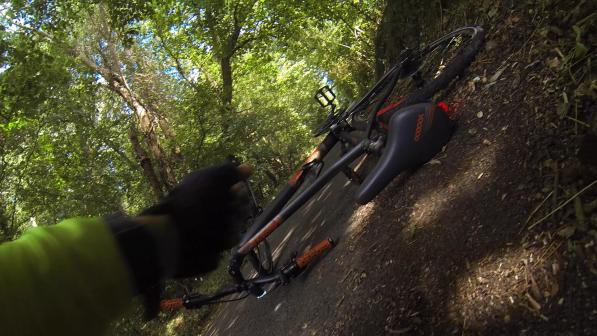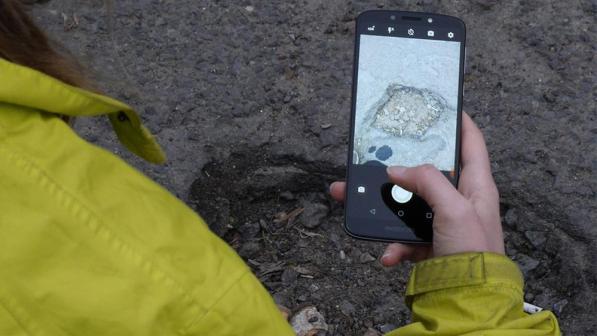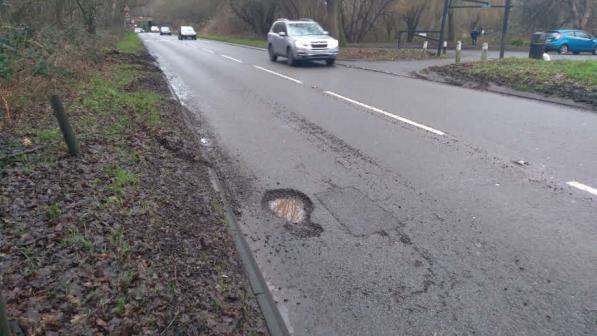What to do about potholes

Of course, potholes in the grand scheme of things are not planet threatening like the pollution which is dumped into our seas on a daily basis, but they do share similarities in two areas. Firstly, no one thinks either of these problems is a good thing, and secondly everyone agrees these are problems which should and can be fixed.
While at Cycling UK we can’t do too much about plastic waste in our seas, we can and are doing something about potholes.
Since 2007, Cycling UK has run Fill That Hole, a tool that helps local authorities across England, Northern Ireland, Scotland and Wales identify where their roads need fixing.
For those unfamiliar with the website, and its later apps for smartphones running on the iOS and Android platforms, Fill That Hole allows individuals to report potholes and other road defects they find and encounter. The report is then sent off to the relevant authority looking after that particular patch of tarmac and that’s it.
Fill That Hole takes the sting out of trying to work out which council you should be reporting your pothole to and makes sure the right one hears about it.
It might not sound especially impressive, but with 214 authorities looking after our local roads in the UK, Fill That Hole takes the sting out of trying to work out which one of them you should be reporting your pothole to and makes sure the right one hears about it.
Our highway authorities have a legal obligation to keep our roads in a good state. They do this by surveying their roads on a regular basis, the frequency of which will depend on the importance of the road (essentially busy link roads and high streets will be a higher priority than a rural lane). When road defects are identified during these surveys, these are then either fixed at the time or scheduled for repair in the near future.
Fill That Hole assists this process with a bit of good old citizen reporting and means the authorities know which areas need repair. The roads many people cycle on, particularly in rural areas, are rarely going to be a high priority for local authorities, which is why the intellligence gathered from Fill That Hole is so useful and cost efficient for highway authorities as we’re providing reports on the roads least checked.
We all know a bad pothole can mean a visit to the garage and a costly repair bill for you when driving, but hit even a minor one at the wrong angle while cycling and the results can be much much worse. At Cycling UK we hear and see the perils caused by potholes on a regular basis, as each year over 6,000 of our members are helped with legal aid following a collision with a pothole that has caused an injury or damage to their property.
Pothole problems for cyclists is one of the reasons why Fill That Hole has been embraced by the cycling community and frequently sits high in lists for 'most useful cycling apps'.
Time and time again at Cycling UK we hear how holes reported via the app are soon fixed and filled – sometimes even on the same day (though that’s probably a bit of luck!). As an organisation, it’s one of our most successful campaigns and has seen close to 147,000 road defects reported since its launch 11 years ago.
As with any technology, there have been some hiccups along the way, with the most recent seeing the iOS app crashing following Apple’s recent operating system software update. That caught us off guard and couldn’t have come at a worse time as pothole season was about to begin.
Understandably, this blip caused some consternation among our more regular users. It will be no consolation to them, but it’s not something we were especially happy to discover either. However, with a mighty big thanks to our volunteer app developers, Cycling UK is pleased to say the faults are rectified and the app is back up and running as well as before.
Running an app clearly is not enough to fill all the holes in Britain. It helps, but Cycling UK is under no illusion it will solve the magnitude of the problem.
Who can fix the problem?
It’s very easy to lay the finger of blame on the shoulders of our highway authorities. After all, it’s their responsibility to keep our roads in good nick, if they’re falling apart, surely it’s their fault, right?
The answer is as ever not quite that simple. It’s no secret our councils are cash strapped and have to spin out their budgets to meet a smorgasbord of needs including, health, social care, education, housing and of course roads.
They do receive funding to keep their roads in a good state from central government. In fact in England the Government has promised £6bn up till 2021 to fix our pothole problem. That’s a lot of money to be sure, but that’s no way near enough. According to the Asphalt Industry Alliance, “Local authorities need over £12 billion to bring the network up to scratch – a figure that has remained largely unchanged for four years.”
At Cycling UK we want to see Government adopt a “fix it first” policy. That means investing properly in our local roads before building new ones.
Sam Jones
There is a solution, it just requires a change of attitude in Government. At Cycling UK we want to see the Government adopt a “fix it first” policy. That means investing properly in our local roads before building new ones.
We don’t think it’s enough for Government to say “local roads are a local problem” while allocating and spending £15bn on new motorways and trunk roads as part of its Road Investment Strategy. After all what good is it for the UK to have gold plated highways if the roads network is crumbling around it?
That doesn’t mean we believe in letting local authorities off the hook though. There is much they can do, beyond simple patching up the roads. Cycling UK sees planned road maintenance as part of the solution – this will not only solve the underlying problems beneath the road surface which results in repeat appearances of potholes in the same place, but also gives the opportunity for the authority to consider changes to its layout like new cycle lanes. It will also save money in the long run.
This is a campaign message Cycling UK will keep taking right into the heart of our national governments until they start fixing our roads. In the meantime whether you cycle or drive, you can help us all and make sure you report those potholes you find with Fill That Hole.







